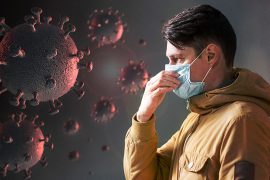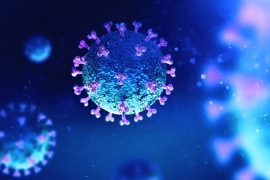Ongoing research by doctors and scientists suggests that the lungs (pulmonary) are the main organs affected by COVID-19 besides the windpipe, nasal cavity, and throat. However, COVID-19 does have the extrapulmonary ability to affect almost every body organ. But the results tend to vary from person to person in terms of the number of organs or organ systems or severity of organ involvement. Doctors are still ascertaining the long-term and short-term effects of COVID-19 on the human body.
Spread of COVID-19
The fastest way COVID-19 spreads is when you come into contact with an infected person (who may or may not feel sick) whose nasal droplets could contaminate your immediate surroundings through coughing, sneezing, or talking without a mask over their mouth and nose. In addition, the virus through an infected person can spread through touching or sharing of common places and articles.
Post-COVID-19 Conditions and Complications
The effects of Covid-19 may not be noticeable right away. They could happen gradually over time.The recovery arcs of COVID-19 patients continue to baffle doctors and scientists worldwide. Many long-term effects of COVID-19 on the human body are still unknown and unclear. Some patients who recover from COVID-19 continue to suffer symptoms even after weeks and months, and the symptoms range from the common to the uncommon,
– Loss of smell
– Loss of hearing
– Joint pain
– Hair loss
– Dull skin
– Headache
– Body ache
– Myalgia (Muscle Pain) for long period
-Insomnia, Anxiety disorder or depression
– Dizziness or lightheaded when you standup from sitting or lying down (Orthostatic Hypotension)
– Common symptoms that gets worse after mental and physical activities.
– A general feeling of weakness
– Lethargy
– Sleepiness
– Irritability
– Frequent diarrhea
– Skin rashes
– High Blood Sugar (Hyperglycemia)
– New Onset Diabeties
– Shortness of breath or difficulty breathing
Children and teens experience multisystem inflammatory syndrome (MIS-C) or Paediatric Multisystem Inflammatory System (PMIS), where common symptoms are fever, red bloodshot eyes, skin rashes, swollen tongue, neck glands, hands and feet, nausea and vomiting, and stomach pain. If left untreated, it can prove to be fatal.
Lung Damage and Respiratory Infections
In terms of infection, symptoms, and side effects, COVID-19 is a respiratory disease; hence, it attacks the lungs first. The virus typically latches on to healthy cells of the human body, especially the lungs, and multiplies fast throughout the body. COVID-19 and its variants start with primary flu-like symptoms within a week of infection. The rapid onset and spread of the disease often lead to fluid collection and lung debris formation. These symptoms descend to respiratory infections like severe cough, shortness of breath (dyspnea), and pulmonary complications like pneumonia,
Acute Respiratory Distress Syndrome (ARDS), or respiratory failure even. These conditions again can vary from mild to severe from person to person, depending on the extent of the disease.
ARDS is turning out to be a severe lung complication of COVID-19 where affected patients struggle with their breathing and may need ventilator support for survival. In addition, those with co-morbidities and underlying health conditions like chronic asthma, pulmonary hypertension, or chronic obstructive pulmonary disease are said to be at higher risk of COVID-19 lung complications.
Shortness of breath and chest pain are the most common symptoms even after the infection is gone. Therefore, it is crucial that after one is sick or recovering from COVID-19, one must do everything possible to get sufficient rest and sleep so that the respiratory system can heal adequately.
Heart and Blood Vessels
COVID-19 patients have experienced severe heart issues in the form of blood clots and clumps that may lead to a stroke or a heart attack or cause heart blockages in the long term. The initial symptoms include palpitations, chest pain, shock, and fatigue.
Blood clots also form in their lungs, arteries, and legs, which can be very dangerous. Timely medical intervention is required in such cases, especially if there are comorbidities like diabetes or cholesterol.
Brain and Eyes
COVID-19 does impact a patient’s brain. In some cases, patients have reported inflammation of the brain and seizures. In severe cases, patients have suffered a cerebral haemorrhage, contracted encephalitis, sunk into a coma, and even lost consciousness.
By and large, COVID-19 impact on the brain can hamper daily life and activities with the following:
– Struggle with memory and retention
– Loss of smell
– Constant weariness
– Throbbing headache
– Disorientation and Dizziness
Some COVID-19 patients have reported eye infections known as pink eye or conjunctivitis.
Liver and Kidney Damage
COVID-19 is frequently known to affect the liver of COVID-19 patients with increased enzyme levels post-recovery. Increasing enzyme levels mean potential liver dysfunction, which can aggravate many digestive disorders.
There is also the added danger with the high doses of COVID-19 medication, which can impair the liver. Medicines, compromised immune systems, low blood pressure, and not-so-ambient health conditions damage the kidneys. It is always advised that COVID-19 patients should declare any pre-existing conditions and support medications with their doctor at the start of COVID-19 medicine.
Does COVID-19 affect your emotional health?
Patients recovering from COVID-19 have reported problems with fluctuating moods and signs of fatigue.
The solitary confinement and quarantine procedures of self-isolation often lead the patient to feelings of fear, loneliness, and financial worry during hospitalization and recovery. This often leads to emotional stress and affects general mental health causing further issues like,
– Loss of appetite
– Lack of sleep (insomnia)
– Near constant anxiety of doomsday feeling and who will provide for the family or what if means run out
– Poor concentration and memory
– Tiredness and Fatigue
– Dull headache
– Dizziness and Forgetfulness
– Brain Fog and disorientation for weeks on end
FAQs
Q – What is a post-COVID-19 condition?
Answer – Some COVID-19 patients demonstrate persistent symptoms for weeks and months after recovering from the infection. This condition is referred to as the long COVID or post-COVID-19 state.
Q- What are the organs affected by COVID-19?
Answer – COVID-19 affects the lungs the most because it is a respiratory disease. In conjunction, it also affects other organs and systems, starting from the heart, kidneys, gut, brain and associated sensory organs like eyes, nose and ears.
Q – What are the complications of COVID-19?
Answer – The rapid onset and spread of infection often lead to fluid collection and debris formation in the lungs and respiratory complications like shortness of breath (dyspnea), pneumonia, Acute Respiratory Distress Syndrome (ARDS), or multi-organ failure, shock and death sometimes.
Q-What are the causes of post COVID syndrome or long COVID?
Answer: As per recent research and report, the possible long covid causes identified in recovered COVID-19 patients may include:
- Reduced or lack of Immune system response.
- Re-infection or several infection of the Virus.
- Multisystem inflammatory syndrome (MIS)
- Prolonged hospitalization due to disease severity.
- Post –traumatic stress
Q- What are the warning signs of post COVID recovery?
Answer: It suggested to watch out warning signs of post COVID conditions such as reappreance of fever, sudden chest pain, continuous shortness of breath, tiredness, muscles or joint pain, dizziness or blackout on standing.
Q- What are the diagnoses of post COVID or long COVID syndrome?
Answer: Apart from checking temperature, blood pressure, pulse rate, SpO2 level and breathing function, physician may require these tests to check the severity of symptoms:
- Complete Blood picture
- Serum Electrolytes
- KFT (Kidney Function Test)
- LFT (Liver Function Test)
- Body Inflammation Level by CRP (C-reactive protein)
- Heart Condition by Troponin-I
- D-Dimer that check no blood clots are present
- Blood Iron Level
- Complete Urine examination




Comments are closed.